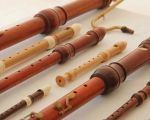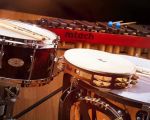Top-Rated Synthesizers for Studio Musicians: The Ultimate Guide for Music Production
- 1. Why Choosing the Right Synthesizer Is Crucial for Studio Musicians
- 2. Key Features to Look for in a Studio Synthesizer
- 3. Top-Rated Synthesizers for Studio Musicians
- 4. How to Choose the Best Synthesizer for Your Studio Setup
- 5. Real-Life Success Stories: Studio Musicians Share Their Favorite Synthesizers
1. Why Choosing the Right Synthesizer Is Crucial for Studio Musicians
For studio musicians, the synthesizer is more than just a tool—it's a vital part of the creative process. The right synthesizer can shape the sound of a track, influence the mood of a song, and provide endless possibilities for sonic exploration. Choosing the best synthesizer for your studio setup isn’t just about brand or features; it’s about finding an instrument that complements your workflow, style, and genre of music.
Studio musicians need a synthesizer that delivers both versatility and reliability. Whether you're creating electronic beats, producing orchestral compositions, or experimenting with experimental soundscapes, a top-quality synthesizer can help bring your musical vision to life. The ideal synthesizer should offer a broad range of sounds, powerful modulation capabilities, and seamless integration with your existing studio gear.
2. Key Features to Look for in a Studio Synthesizer
When evaluating synthesizers for your studio, there are several key features to consider that will influence your music production experience. Here are the most important factors to keep in mind:
- Sound Engine: The heart of any synthesizer is its sound engine. Look for a synthesizer that offers a wide range of oscillators, filters, and modulation options. Analog, digital, and hybrid models each have unique sound qualities that may suit different genres and production styles.
- Polyphony: The polyphony of a synthesizer refers to the number of notes it can play simultaneously. A higher polyphony allows for more complex, layered sounds. Studio musicians who need intricate chords or lush pads should prioritize a synthesizer with high polyphony.
- Sequencer and Arpeggiator: Built-in sequencers and arpeggiators can help automate and enhance your creative process, especially when crafting repetitive patterns or evolving melodies. These features are invaluable for adding movement and texture to your tracks.
- Connectivity: A synthesizer with extensive connectivity options, such as MIDI, USB, and audio outputs, will integrate seamlessly with your DAW (Digital Audio Workstation) and other studio equipment. Make sure the synthesizer can communicate effectively with your setup.
- Build Quality: Since studio synthesizers are often used for long hours in a professional environment, robust build quality is essential. A durable, well-constructed instrument can withstand the rigors of daily studio use while maintaining consistent performance.
By considering these features, you can select a synthesizer that will enhance your music production workflow and provide the sound versatility required for your studio projects.
3. Top-Rated Synthesizers for Studio Musicians
If you're looking for a synthesizer that delivers high performance and rich sound, these top-rated models are ideal for studio musicians. Here are some of the best synthesizers currently available for music production:
- Moog Subsequent 37: This monophonic analog synthesizer is perfect for musicians who love deep basses and rich, fat sounds. With its legendary Moog filter, the Subsequent 37 offers a wide range of tones and powerful modulation capabilities, making it a favorite among studio musicians.
- Roland Jupiter-X: Combining classic Roland analog sounds with modern digital capabilities, the Jupiter-X is a powerhouse for musicians who want both traditional warmth and cutting-edge sounds. It’s ideal for studio setups where versatility and high-quality sound are paramount.
- Yamaha MODX8: A hybrid synthesizer offering both FM synthesis and sample-based synthesis, the MODX8 is perfect for musicians who need a wide array of sounds. Its compact design and powerful engine make it ideal for both studio use and live performances.
- Arturia MatrixBrute: Arturia's MatrixBrute is a semi-modular analog synthesizer that combines hands-on control with a rich, full-bodied sound. Its matrix modulation system allows musicians to create complex, evolving sounds with ease, making it a popular choice for studio musicians looking for deep sound design possibilities.
- Korg Minilogue XD: This analog/digital hybrid synthesizer is perfect for musicians on a budget but still looking for a high-quality sound engine. The Minilogue XD is known for its rich, warm sounds and intuitive interface, making it a fantastic option for both beginners and experienced producers alike.
These synthesizers are among the best for studio musicians, offering a range of features and sounds to help bring your music production to the next level.
4. How to Choose the Best Synthesizer for Your Studio Setup
Choosing the right synthesizer for your studio setup requires a deep understanding of your musical needs and workflow. Here’s how you can make the best choice:
- Assess Your Music Style: Different synthesizers excel at different styles of music. If you produce electronic music, you may prefer a synthesizer with extensive modulation options, while if you’re creating orchestral scores, you might prioritize a synthesizer with strong polyphony and realistic sounds.
- Consider Space and Portability: If you have limited space in your studio, consider a more compact synthesizer. Some synthesizers are designed for portability, making them ideal if you plan to take your gear on the road.
- Test the Sound: Always try out a synthesizer before purchasing it if possible. Listen to the different patches and experiment with the controls to get a feel for how the synthesizer handles. Sound quality should be your top priority.
- Set Your Budget: High-end synthesizers can be pricey, but there are also affordable models that deliver excellent performance. Set a budget and weigh the features you need against the cost of the synthesizer.
By carefully considering these factors, you can choose a synthesizer that complements your workflow, sound preferences, and studio setup.
5. Real-Life Success Stories: Studio Musicians Share Their Favorite Synthesizers
Many studio musicians have shared how certain synthesizers have revolutionized their creative process. For instance, Sarah, a professional producer, swears by the Moog Subsequent 37: “It’s my go-to synthesizer for basslines and leads. The sound is unparalleled, and it integrates seamlessly into my studio setup. It’s an essential tool in my production.”
Another example comes from Mike, a sound designer for films, who loves the Arturia MatrixBrute: “The hands-on control of the MatrixBrute allows me to experiment with sound in ways I couldn’t before. The flexibility it offers in terms of modulation makes it perfect for creating unique soundscapes for film scores.”
These success stories highlight how choosing the right synthesizer can elevate a studio musician’s creativity and productivity, offering both inspiration and technical performance.








